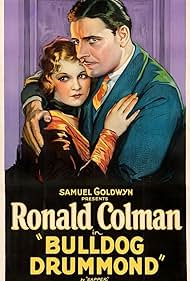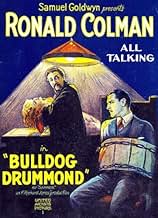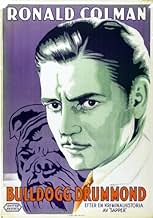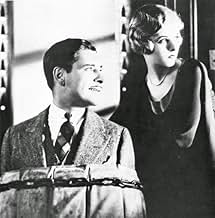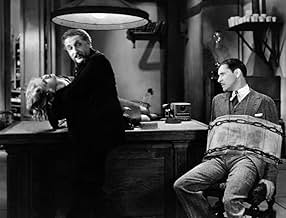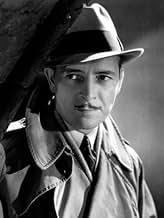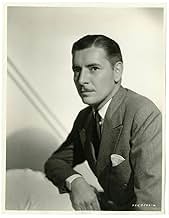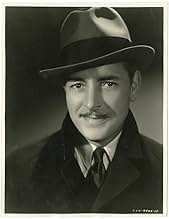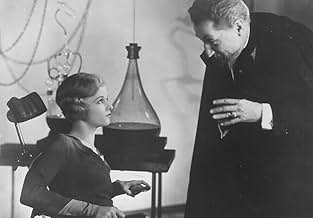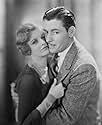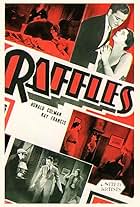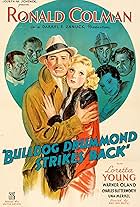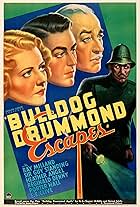IMDb RATING
6.3/10
1.4K
YOUR RATING
A bored WWI veteran helps out a young woman whose uncle is being held hostage by embezzlers.A bored WWI veteran helps out a young woman whose uncle is being held hostage by embezzlers.A bored WWI veteran helps out a young woman whose uncle is being held hostage by embezzlers.
- Director
- Writers
- Stars
- Nominated for 2 Oscars
- 5 wins & 2 nominations total
Claud Allister
- Algy
- (as Claude Allister)
Bill Johnson
- Little Boy
- (uncredited)
Tom Ricketts
- Colonel in Club
- (uncredited)
- Director
- Writers
- All cast & crew
- Production, box office & more at IMDbPro
Featured reviews
Melodramatic, overacted, and occasionally senseless, but who cares? Colman is almost devestatingly charming in his first talkie, Bennett is lovely (but a bit whiny at first), and Algy is a first class twit. The villains are vile, the action is fast once you adjust, and Colman is a sheer delight to watch. Why there hasn't been a major Colman revival is beyond comprehension.
Bulldog Drummond is best known for being the debut of Ronald Colman in sound pictures. It was one auspicious debut to say the least.
A whole lot is written about the stars who could not make the transition to sound, mainly because for one reason or another their voices did not match the screen persona they created. The other reason is that many tended to overact in the way they had to in silent films to put across their feelings.
But there are several examples of those players who voices completely matched their screen personalities so much so that I can't envision them in silent films. Stan Laurel and Oliver Hardy and W.C. Fields in comedy were so much better in sound I can't see how they did it silent films. Gary Cooper was another, his Montana drawl perfectly fit his screen image. William Powell's years of stage training and that perfect diction helped him bridge the transition.
But Ronald Colman was something unique. The greatest voice in the history of cinema, a man you could listen and be enthralled by him reciting your local yellow pages. His perfect Oxford English was so right for his character of English adventurer Bulldog Drummond.
This was the first Drummond film and the part was to be played by several other actors including Colman again. But this film seems to have set the format out. Drummond, a veteran of the World War, was your typical upper middle class English gent who's just plain bored by a rather useless life. He takes out an advertisement basically putting himself out in the way Edward Woodward did sixty years later in the television series The Equalizer. Of course he gets several replies back, but Colman responds to a note from American Joan Bennett.
It seems that Bennett's uncle, an American millionaire, is being held captive by Lilyan Tashman and her associates in a disguised asylum where they have him drugged and gradually turning over his fortune.
Bennett is a sweet young thing, but the role with real bite in it is Lilyan Tashman doing the kind of part Gale Sondergaard did later on. Tashman kind of has a thing for Colman, mainly because he's a man who doesn't fall for her charms as chief assistant Montagu Love has. No pun intended, but Montagu's practically her love slave.
Bulldog Drummond would have rated higher with me, but I simply could not stand Claud Allister's portrayal of Algy, Drummond's tag along friend from his club who's the quintessence of every silly sot of an Englishman every done on screen. I mean he's worse than useless, he's counterproductive. Colman should have let Tashman and her goons have him.
Noted radio singer Donald Novis sang a couple of songs in a country inn where a lot of the story takes place. Novis had a great lyric tenor and starred on Broadway and radio as well as making a few films. He's best know for playing the lead role on Broadway in Rodgers&Hart's Jumbo and introducing the song The Most Beautiful Girl in the World. This was Novis's screen debut, but sad to say he never had much of a film career.
For those fans of Ronald Colman, Anglophiles around the world who see in him the best embodiment of the UK national character.
A whole lot is written about the stars who could not make the transition to sound, mainly because for one reason or another their voices did not match the screen persona they created. The other reason is that many tended to overact in the way they had to in silent films to put across their feelings.
But there are several examples of those players who voices completely matched their screen personalities so much so that I can't envision them in silent films. Stan Laurel and Oliver Hardy and W.C. Fields in comedy were so much better in sound I can't see how they did it silent films. Gary Cooper was another, his Montana drawl perfectly fit his screen image. William Powell's years of stage training and that perfect diction helped him bridge the transition.
But Ronald Colman was something unique. The greatest voice in the history of cinema, a man you could listen and be enthralled by him reciting your local yellow pages. His perfect Oxford English was so right for his character of English adventurer Bulldog Drummond.
This was the first Drummond film and the part was to be played by several other actors including Colman again. But this film seems to have set the format out. Drummond, a veteran of the World War, was your typical upper middle class English gent who's just plain bored by a rather useless life. He takes out an advertisement basically putting himself out in the way Edward Woodward did sixty years later in the television series The Equalizer. Of course he gets several replies back, but Colman responds to a note from American Joan Bennett.
It seems that Bennett's uncle, an American millionaire, is being held captive by Lilyan Tashman and her associates in a disguised asylum where they have him drugged and gradually turning over his fortune.
Bennett is a sweet young thing, but the role with real bite in it is Lilyan Tashman doing the kind of part Gale Sondergaard did later on. Tashman kind of has a thing for Colman, mainly because he's a man who doesn't fall for her charms as chief assistant Montagu Love has. No pun intended, but Montagu's practically her love slave.
Bulldog Drummond would have rated higher with me, but I simply could not stand Claud Allister's portrayal of Algy, Drummond's tag along friend from his club who's the quintessence of every silly sot of an Englishman every done on screen. I mean he's worse than useless, he's counterproductive. Colman should have let Tashman and her goons have him.
Noted radio singer Donald Novis sang a couple of songs in a country inn where a lot of the story takes place. Novis had a great lyric tenor and starred on Broadway and radio as well as making a few films. He's best know for playing the lead role on Broadway in Rodgers&Hart's Jumbo and introducing the song The Most Beautiful Girl in the World. This was Novis's screen debut, but sad to say he never had much of a film career.
For those fans of Ronald Colman, Anglophiles around the world who see in him the best embodiment of the UK national character.
When the first "Bulldog Drummond" stories came out in the 1920s, Great Britain was trying to come to grips with an anomaly: it had been one of the main allied victors in the Great War but the country did not feel like it won anything. It felt it had sacrificed too much.
Britain in 1914 had ruled the waves. It had a small (but apparently competent) standing army. It had a history of democracy that was stable and unmatched by any of the major continental powers of Europe. It had a very highly industrial economy and was commercially quite important on the globe. Finally, it's empire stretched around the world that the boast that "the sun never set on the British Empire" was true - it was also the world's largest empire.
In truth Britain's empire was actually wearing away. Though the British technically won the Boer War Boer Leaders ended up running South Africa. Ireland was getting hotter. The Germans helped stimulate the Easter Rebellion with arms. The British Navy did control the seas but the u-boats almost beat Britain during the war. The naval battles were marred by a total German triumph under Von Spee in the Pacific (Coronel)and the lopsided British ship and men losses at their "victory" at Jutland. Finally, Germany and the U.S. had outstripped British commerce and industrial output by 1914.
With the huge losses of a generation of men, and no tangible gains, Britain was in for a serious period of reactionary feelings and even race baiting. Anti-Semitism (always under the surface) reemerged in the 1920s, mostly due to the rise of Bolshevism in Russia after the 1917 revolutions. The political landscape did not reduce this hysteria. Lloyd George was booted out of the Prime Minister's seat forever in 1922. His successor, Andrew Bonar Law, died after nine months in office. Stanley Baldwin was not fully ready to be Prime Minister in 1923, and would blow his administration by a public hissy fit. His rival, James Ramsay MacDonald, would be the first Labor Prime Minister. But he'd been an outspoken pacifist in the war, and he was suspect of Bolshevistic sympathies (he actually had none). In the 1924 General Election a forged letter (supposedly from Gregory Zinovieff, the head of the Russian Comintern) urged MacDonald's election as an agent of the Russians. Baldwin regained office with a large majority.
It is this background that explains the popularity of "Bulldog Drummond". With governmental drift and doldrums, a declining economy, a feeling of loss of face on the international scene, and a feeling of loss due to immense death toll, the search for easy answers, easy suspects, easy enemies was ready for Sapper's poison. So the public cheered Col. Hugh "Bulldog" Drummond as he created a fascistic group of ex soldiers (like the German Freikorps) to "control" the internal enemy (i.e., Bolsheviks, Jews, Irish). I might add this was not totally made up. Lloyd George gave the go ahead while Prime Minister to create a paramilitary group in Ireland, the "Black and Tans", to combat the Irish revolutionaries. This group was finally decimated by Michael Collins' men on "Bloody Sunday" in 1921.
That Samuel Goldwyn, a Jewish American film producer, produced BULLDOG DRUMMOND, is highly ironic. But it illustrates the care Goldwyn brought to his projects. He had been producing the silent film hits that Ronald Colman appeared in in the late 1920s. Goldwyn wanted Colman to make the transition to sound carefully, and not fall on his face like Colman's rival John Gilbert. Instead of "Darling, I love you!" in HIS GLORIOUS NIGHT, Goldwyn found an exciting adventure part for Colman, which allowed him to display his wonderful, gentleman's speaking voice. As an introduction for a talking Colman, BULLDOG DRUMMOND could not be beaten.
The role had everything to show Colman's versatility. There was his humor, shown at the beginning when he is dismayed at the ridiculously boring men's club he belongs to (full of old fogies). There was his romantic side, with the youthful Joan Bennett. There is his confrontations with the sinister Lawrence Grant (Dr. Lakington) and Grant's two assistants Montague Love and Lilyan Tashman (Carl Peterson and Irma), and his handling of his impossibly stupid friend Algy (Claude Allister). As a "coming out" role for talkies, BULLDOG DRUMMOND did the trick, winning Colman the audience he feared talking films would cost him.
In terms of plot it creaks, with incredible coincidences and twists that allow plot points to fall apart for the creation of new plot points. Still the cast is game, and the script surprises us. Lakington, briefly having Drummond tied up, is speaking to him pretty closely. Colman turns his face from Grant, who accuses him of being more cowardly than he'd admit. Colman rejects this excuse. Then why turn your face away, demands Grant. "Haven't your best friends told you?", says Colman, leaving Grant turning crimson at the thought of halitosis. A later bit of business, allowing Love and Tashman to escape is also unexpected. Yes, it is an antique, but it is a charming one. And as it has none of Sapper's racist crap in it, it is highly recommended.
Britain in 1914 had ruled the waves. It had a small (but apparently competent) standing army. It had a history of democracy that was stable and unmatched by any of the major continental powers of Europe. It had a very highly industrial economy and was commercially quite important on the globe. Finally, it's empire stretched around the world that the boast that "the sun never set on the British Empire" was true - it was also the world's largest empire.
In truth Britain's empire was actually wearing away. Though the British technically won the Boer War Boer Leaders ended up running South Africa. Ireland was getting hotter. The Germans helped stimulate the Easter Rebellion with arms. The British Navy did control the seas but the u-boats almost beat Britain during the war. The naval battles were marred by a total German triumph under Von Spee in the Pacific (Coronel)and the lopsided British ship and men losses at their "victory" at Jutland. Finally, Germany and the U.S. had outstripped British commerce and industrial output by 1914.
With the huge losses of a generation of men, and no tangible gains, Britain was in for a serious period of reactionary feelings and even race baiting. Anti-Semitism (always under the surface) reemerged in the 1920s, mostly due to the rise of Bolshevism in Russia after the 1917 revolutions. The political landscape did not reduce this hysteria. Lloyd George was booted out of the Prime Minister's seat forever in 1922. His successor, Andrew Bonar Law, died after nine months in office. Stanley Baldwin was not fully ready to be Prime Minister in 1923, and would blow his administration by a public hissy fit. His rival, James Ramsay MacDonald, would be the first Labor Prime Minister. But he'd been an outspoken pacifist in the war, and he was suspect of Bolshevistic sympathies (he actually had none). In the 1924 General Election a forged letter (supposedly from Gregory Zinovieff, the head of the Russian Comintern) urged MacDonald's election as an agent of the Russians. Baldwin regained office with a large majority.
It is this background that explains the popularity of "Bulldog Drummond". With governmental drift and doldrums, a declining economy, a feeling of loss of face on the international scene, and a feeling of loss due to immense death toll, the search for easy answers, easy suspects, easy enemies was ready for Sapper's poison. So the public cheered Col. Hugh "Bulldog" Drummond as he created a fascistic group of ex soldiers (like the German Freikorps) to "control" the internal enemy (i.e., Bolsheviks, Jews, Irish). I might add this was not totally made up. Lloyd George gave the go ahead while Prime Minister to create a paramilitary group in Ireland, the "Black and Tans", to combat the Irish revolutionaries. This group was finally decimated by Michael Collins' men on "Bloody Sunday" in 1921.
That Samuel Goldwyn, a Jewish American film producer, produced BULLDOG DRUMMOND, is highly ironic. But it illustrates the care Goldwyn brought to his projects. He had been producing the silent film hits that Ronald Colman appeared in in the late 1920s. Goldwyn wanted Colman to make the transition to sound carefully, and not fall on his face like Colman's rival John Gilbert. Instead of "Darling, I love you!" in HIS GLORIOUS NIGHT, Goldwyn found an exciting adventure part for Colman, which allowed him to display his wonderful, gentleman's speaking voice. As an introduction for a talking Colman, BULLDOG DRUMMOND could not be beaten.
The role had everything to show Colman's versatility. There was his humor, shown at the beginning when he is dismayed at the ridiculously boring men's club he belongs to (full of old fogies). There was his romantic side, with the youthful Joan Bennett. There is his confrontations with the sinister Lawrence Grant (Dr. Lakington) and Grant's two assistants Montague Love and Lilyan Tashman (Carl Peterson and Irma), and his handling of his impossibly stupid friend Algy (Claude Allister). As a "coming out" role for talkies, BULLDOG DRUMMOND did the trick, winning Colman the audience he feared talking films would cost him.
In terms of plot it creaks, with incredible coincidences and twists that allow plot points to fall apart for the creation of new plot points. Still the cast is game, and the script surprises us. Lakington, briefly having Drummond tied up, is speaking to him pretty closely. Colman turns his face from Grant, who accuses him of being more cowardly than he'd admit. Colman rejects this excuse. Then why turn your face away, demands Grant. "Haven't your best friends told you?", says Colman, leaving Grant turning crimson at the thought of halitosis. A later bit of business, allowing Love and Tashman to escape is also unexpected. Yes, it is an antique, but it is a charming one. And as it has none of Sapper's racist crap in it, it is highly recommended.
Captain Bulldog Hugh Drummond (Ronald Coleman) is bored. He is bored of peace in a contracting British empire made so by the decimation of everybody who was of fighting age in WWI. Hugh is one of the few survivors of that war and he longs for adventure. So he puts an ad in the paper saying he is looking for adventure, and would rather crime not be involved but won't rule it out.
He gets tons of responses, but the letter of Phyllis (Joan Bennett) asking for help strikes his fancy and especially the mystery she puts around their meeting. She has reserved a room for them in a local inn. On the appointed day Drummond arrives at the inn, goes to the room, and soon in walks a woman dressed from head to toe in black. She uncovers her face, and Drummond is instantly smitten. She tells a rather fantastic tale of how her fabulously wealthy uncle is being held captive in an asylum in a plot to rob him of his assets and how she is being watched by the people who run the asylum. That was why she chose the remote inn in the middle of the night. Now Drummond's friend Algie and Drummond's butler have followed Drummond to the inn, and prior to Phyllis' entry Drummond has locked them in the bedroom. While all of this conversation is going they are listening in.
Now Phyllis could have been a complete crackpot, but in the middle of their meeting in come the people running the asylum and fetch Phyllis back, validating her story. Drummond follows them, gets Phyllis out, manages to grab the uncle too, and then after some clever maneuvers in a high speed chase, makes a bone headed mistake - he takes them BOTH BACK to the inn where the villains found them in the first place. Of course they show up AGAIN. How will all of this work out? Watch and find out.
This is not to say that the villains do not make mistakes or strange decisions. They seem to be running an asylum in a huge castle like structure in which Phyllis' uncle is the only inmate. Nice work if you can get it.
This was a very well done early talkie. The entire film takes place at night, the architecture looks like something straight out of a German expressionist film, and the dialogue and performances are not static or stilted at all. There is clever use of the camera to give the illusion of motion where there really cannot be any, and the same is true for Colman's performance - he was actually wounded badly in WWI and could not use one leg hardly at all. Yet when you think back after watching, you'll swear he was climbing and swinging about like Errol Flynn.
Lilyan Tashman steals the show as the villainess, who for some reason is dressed up in an evening gown for all of this skulking about. Drummond may be her technical enemy, but you can tell by every word she says she is sexually attracted to him, if only she could get him under her spell.
This film was Joan Bennett's first talking film, Ronald Colman's second talking film and first surviving one, and Lilyan Tashman's second talking role. For these three actors, the coming of sound was a boost to their careers rather than the end of them. Of course, Colman had been a star for some years, but his marvelous voice would have made it a pleasure to listen to him recite the dictionary. Watch it for the fun, romance, and adventure of it all.
One more thing, unlike James Bond, apparently Bulldog Drummond was extremely monogamous. In the later low budget Drummond pictures of the late 30's with John Howard in the starring role Drummond is engaged to a girl named Phyllis. The joke of the series is how the planned wedding just never manages to come off because of some mystery into which Drummond becomes entangled. It's good B fun but this is the first and the best of the talking Bulldog Drummond films, largely because of the charming Ronald Colman.
He gets tons of responses, but the letter of Phyllis (Joan Bennett) asking for help strikes his fancy and especially the mystery she puts around their meeting. She has reserved a room for them in a local inn. On the appointed day Drummond arrives at the inn, goes to the room, and soon in walks a woman dressed from head to toe in black. She uncovers her face, and Drummond is instantly smitten. She tells a rather fantastic tale of how her fabulously wealthy uncle is being held captive in an asylum in a plot to rob him of his assets and how she is being watched by the people who run the asylum. That was why she chose the remote inn in the middle of the night. Now Drummond's friend Algie and Drummond's butler have followed Drummond to the inn, and prior to Phyllis' entry Drummond has locked them in the bedroom. While all of this conversation is going they are listening in.
Now Phyllis could have been a complete crackpot, but in the middle of their meeting in come the people running the asylum and fetch Phyllis back, validating her story. Drummond follows them, gets Phyllis out, manages to grab the uncle too, and then after some clever maneuvers in a high speed chase, makes a bone headed mistake - he takes them BOTH BACK to the inn where the villains found them in the first place. Of course they show up AGAIN. How will all of this work out? Watch and find out.
This is not to say that the villains do not make mistakes or strange decisions. They seem to be running an asylum in a huge castle like structure in which Phyllis' uncle is the only inmate. Nice work if you can get it.
This was a very well done early talkie. The entire film takes place at night, the architecture looks like something straight out of a German expressionist film, and the dialogue and performances are not static or stilted at all. There is clever use of the camera to give the illusion of motion where there really cannot be any, and the same is true for Colman's performance - he was actually wounded badly in WWI and could not use one leg hardly at all. Yet when you think back after watching, you'll swear he was climbing and swinging about like Errol Flynn.
Lilyan Tashman steals the show as the villainess, who for some reason is dressed up in an evening gown for all of this skulking about. Drummond may be her technical enemy, but you can tell by every word she says she is sexually attracted to him, if only she could get him under her spell.
This film was Joan Bennett's first talking film, Ronald Colman's second talking film and first surviving one, and Lilyan Tashman's second talking role. For these three actors, the coming of sound was a boost to their careers rather than the end of them. Of course, Colman had been a star for some years, but his marvelous voice would have made it a pleasure to listen to him recite the dictionary. Watch it for the fun, romance, and adventure of it all.
One more thing, unlike James Bond, apparently Bulldog Drummond was extremely monogamous. In the later low budget Drummond pictures of the late 30's with John Howard in the starring role Drummond is engaged to a girl named Phyllis. The joke of the series is how the planned wedding just never manages to come off because of some mystery into which Drummond becomes entangled. It's good B fun but this is the first and the best of the talking Bulldog Drummond films, largely because of the charming Ronald Colman.
VERY early talkie from 1929. It stars Ronald Colman as a wealthy WW1 veteran--Hugh "Bulldog" Drummond. He sets out to help people in trouble. He gets a letter from the mysterious Phyllis (Joan Bennett) who believes her father is being held against his will and tortured in a nursing home. She wants Bulldog to rescue him. He agrees and is helped by his faithful valet and annoying best friend Algy (Claud Allister).
Most early talkies are boring stiff affairs but not this one. It moves quickly, is lots of fun, has exciting action sequences and has a great Oscar-nominated performance by Colman. The sound recording is good and the video is as good as can be expected from a 1929 film. The only negative about this is Allister as Algy. He plays his role WAY over the top and comes across as annoying and unfunny. Halfway through I wanted that guy gone! Him aside though this is an enjoyable and fun early talkie.
Most early talkies are boring stiff affairs but not this one. It moves quickly, is lots of fun, has exciting action sequences and has a great Oscar-nominated performance by Colman. The sound recording is good and the video is as good as can be expected from a 1929 film. The only negative about this is Allister as Algy. He plays his role WAY over the top and comes across as annoying and unfunny. Halfway through I wanted that guy gone! Him aside though this is an enjoyable and fun early talkie.
Storyline
Did you know
- TriviaThe first (and only) sound film for former Mack Sennett director F. Richard Jones. His command of sound and action with this film was very well received, and he looked set for a bright future. Sadly, Jones succumbed to the tuberculosis epidemic that was running rampant at the time. He was only 37.
- GoofsThe players in the opening credits are set out in the form of a theatre programme. However, notwithstanding the film takes place in England, the spelling on the programme is the American 'program'. However, while the film is portrayed as taking place in England, it was produced in the U.S.; thus, the Americanized spelling of "program" in the credits is not inconsistent.
- Quotes
Hugh 'Bulldog' Drummond: Danny, pack my bag. Pyjamas, toothbrush and a gun.
Danny: Please sir. Don't you really think sir? Yes sir.
Hugh 'Bulldog' Drummond: On second thought, never mind the pyjamas. Just the toothbrush and the gun.
- Crazy creditsThe cast listing resembles a play program with six listed names/roles on each of two pages. Both pages have "Program Continued" at the top of the list and "Program Continued On Following Page" at the bottom.
- Alternate versionsWhen first released in France, the film was presented in a talkie version in English with French subtitles and in a silent version.
- ConnectionsFollowed by Temple Tower (1930)
- How long is Bulldog Drummond?Powered by Alexa
Details
- Release date
- Country of origin
- Language
- Also known as
- El capitán Drummond
- Filming locations
- South Bank, Lambeth, London, England, UK(opening scene)
- Production company
- See more company credits at IMDbPro
Box office
- Budget
- $550,000 (estimated)
- Runtime1 hour 30 minutes
- Color
- Sound mix
- Aspect ratio
- 1.20 : 1
Contribute to this page
Suggest an edit or add missing content

